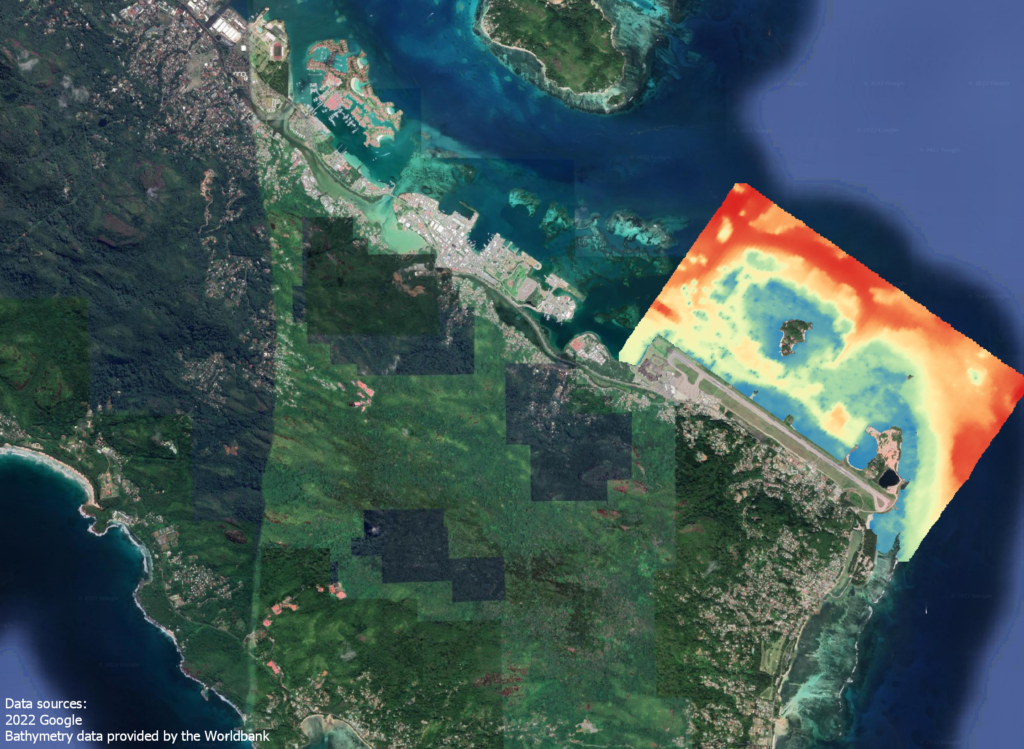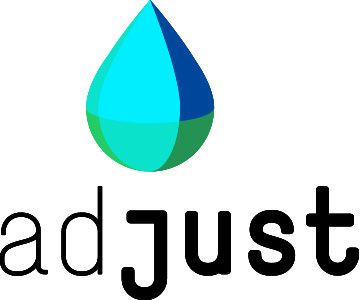E-newsletter
Adjust newsletter #3
Here comes the third newsletter of Project adjust and we are happy to announce our upcoming events!
Dr. John Rapaglia in the Seychelles
We are pleased to announce that Dr. John Rapaglia will be travelling to the Seychelles for six weeks starting September 20th 2023. He will continue to develop the collaboration between Project adjust and our partners in the Seychelles.
John Rapaglia is a member of Nassos Vafeidis’ Coastal Risks and Sea-Level Rise research group and a coastal oceanographer who received his PhD from the School of Marine and Atmospheric Sciences at Stony Brook University, New York. His research has focused, among others, on the Venice Lagoon, Italy; where he earned a posting as a post-doctoral researcher at the Consiglio Nazionale delle Richerche in Venice. In addition, during a recent posting as an assistant professor at Sacred Heart University in Connecticut, USA, he helped develop a living shoreline project to restore a salt marsh community in a lead contaminated site in Long Island Sound.
Dr. Rapaglia is excited to travel to the Seychelles to deepen the collaboration between the Seychelles and Kiel University. Following up on our stay in March and April 2022, his plan is to collect data for supporting our modelling experiments and explore how his research may benefit the Seychelles beyond work within Project adjust. To this end, he will meet with representatives from relevant ministries, authorities and Seychelles University and is keen on meeting other interested parties.
Dr. Rapaglia will attempt to map existing coastal protection structures along the coastlines of Mahé, Praslin, and La Digue, in order to better ascertain potential hot spots of erosion and for use in the regional DIVA model. He further aims to deploy pressure sensors in several locations around Mahé to gain insight into inundation depths during possible flooding events. Last, Dr. Rapaglia will conduct a radon survey in one or multiple bays in the Seychelles to ascertain the role groundwater discharge may play in coastal processes, particularly the reestablishment of coral reefs. Finally, during his time in the Seychelles he hopes to expand the stakeholder community discussion as well as to introduce some scientific techniques to University students.
If you would like to get in contact with Dr. Rapaglia during his stay in the Seychelles, please reach out to the adjust team (fehling@geographie.uni-kiel.de) or directly to John (rapaglia@geographie.uni-kiel.de).
Seychelles officers visit Kiel University
Two officers from the Seychelles, Amanda Port-Louis (MACCE) and Simon Dugasse (DRMD), will visit Kiel University from September 2-16, hosted by Project adjust. Nassos Vafeidis and Dorothee Fehling will supervise their training on coastal flood modelling and risk analysis. A secondary goal of their visit is to discuss how research can best support the analysis and mitigation of coastal risks in the Seychelles.
Second adjust stakeholder workshop
We are in the process of scheduling the SECOND ADJUST STAKEHOLDER WORKSHOP in the Seychelles for September 2024. This workshop will focus on the presentation of results from flood modelling and DIVA analysis. On that basis, workshop participants will discuss priorities for future coastal adaptation. The outcome of that discussion will inform adaptation pathways for the Seychelles which will be developed in close cooperation with all interested Seychellois stakeholders. In addition to the workshop, we are collaborating with the University of Seychelles to teach a one-week course on coastal flood modelling during our stay.
Adjust conference in Berlin on adaptation and loss and damage finance
On February 22nd-23rd 2024 we will host a conference in Berlin in partnership with Climate Analytics. The conference will be on Justice in Finance for Climate Change Adaptation and Loss and Damage. Our aim is to promote an exchange between academics, decision-makers, NGOs and think tanks. The event will take place in a hybrid format, allowing both in-person and virtual participation. We would be very happy to welcome Seychellois participants at the conference. Here is the call for contributions.
Model validation with photos
We need to validate our model outcomes with real-world data to produce meaningful results with flood modelling. The date can consist of photos and videos of a flood or measured data like e.g. time series of a tide gauge or. Since such data is scarce in Seychelles, we appreciate it if you share any kind of photos or videos of flood events that you may have witnessed. They are most meaningful to us if you add the following information:
- Exact date and time
- Exact location, ideally in coordinates
- Is the water coming from rainfall/from land or from the ocean?
If you don’t remember some of these specifics, you can look them up in the metadata of the photos or videos as those are often saved automatically by smartphones. If you do not have this detailed information, just send us your material without it. You can share those data via email to fehling@geographie.uni-kiel.de. Thank you!
Adjust newsletter #2
Just over a month ago, the research team adjust and the Ministry of Agriculture, Climate Change and Environment co-hosted an on-site workshop in Seychelles. Local stakeholders were invited to share their perception of research needs regarding Seychelles’ vulnerability to sea-level rise and adaptation options.
On March 30 and 31, representatives from governmental bodies, the civil society and the research team adjust engaged in discussions to develop joint research questions and priorities for the assessment of coastal vulnerabilities based on stakeholders’ knowledge and needs. The research team presented modelling options for coastal flooding and provided some background on sea-level rise in Seychelles and general adaptation options.
The workshop was perceived as fruitful by the stakeholders and us, team adjust. We gathered its contents and the lessons learned in a detailed workshop report which can be found here.
We want to thank everyone who participated in the workshop for sharing your time and insights.
Building on the now established local network, we want to emphasize that you can contribute to the modelling work by providing pictures and videos of flood events at the coast. Your support would be greatly appreciated. These items would be most useful if they included flooded items helping to approximate water depth (e.g. stairs, cars). If you are able to help, please upload pictures/videos here: https://cloud.rz.uni-kiel.de/index.php/s/Qffb2KmSdkQgZ5n.
The workshop is part of a larger research project of the team adjust from Kiel University in Germany, led by Prof. Christian Baatz. The team investigates how global climate finance can be distributed more fairly, taking into account the diversity of climate hazards and uneven vulnerability of countries around the globe.
The project includes an assessment of vulnerability to sea-level rise on Seychelles, led by Prof. Dr. Nassos Vafeidis. The aim is to generate detailed knowledge on potential sea-level rise impacts under a variety of future scenarios. To design the study in a way that is useful for stakeholders in the Seychelles, the team works in close collaboration with the Climate Change Department of the MACCE and other key stakeholders, and is supported by the local NGO Sustainability for Seychelles.
Feel free to reach out to us or our focal point Michele Martin as needed.
Adjust newsletter #1
Welcome to the first newsletter of Kiel University’s adjust research project! In the following section we will introduce you to the research group and give you an overview of our recent and upcoming events.
This is the first in a series of newsletters, through which we will provide regular updates on our work to all interested parties and stakeholders. We hope that you will find it informative and we encourage you to get in touch if you have any questions about our work or insights that you would like to contribute
If you want to stay up to date, sign up for the newsletter here (external link).

Introduction to Project adjust
The adjust research group was set up in 2020 and is based at Kiel University in Germany. It explores how existing funding for climate adaptation could be allocated more fairly by examining the funding allocation procedures and criteria used at both the international and the sub-national levels. As part of this research, we are doing a case study on Seychelles to better understand the country’s vulnerability to sea-level rise and the current access to and allocation of climate finance. Attached to this email is an outline of the objectives and methods of the vulnerability research.
The group is trans-disciplinary, which means that we aim to include non-academic stakeholders in our research. Thus, in addition to the core members of the group, we try to actively involve interested groups from government and civil society in the Seychelles to collaboratively shape our research aims and outcomes.
The group consists of:
Christian Baatz – Project leader
Doro Fehling – PhD student conducting the case study on the vulnerability to sea-level rise
Clara Gurresø – PhD student examining the current criteria and procedures used to allocate adaptation finance
Alex Schulan & Nils Wendler – PhD students examining the normative aspects of allocation criteria
Jochen Heubach – Research group coordinator
Nassos Vafeidis – Professor at Kiel University supervising the study on sea-level rise
Carola Klöck – Professor at Science Po in Paris supervising the investigation of criteria and procedures
Local Partner: Sustainability for Seychelles – we are working with S4S to help us connect with local stakeholders and ensure that the project is relevant to local needs and priorities. Feel free to reach out to our focal point Michele Martin as needed.
Recent Activities
International Conference on Climate Adaptation Finance
In September 2021, we hosted an international conference on “Climate Change Adaptation Finance: Normative and Empirical Perspectives”. Over the course of two days, experts on climate finance, adaptation and climate ethics presented their research and shared insights from their work (for more information visit Conference 2021).
Kick-off Meeting with Seychellois Stakeholders
In May 2021, we held our first Seychelles stakeholder meeting with representatives from the Ministry of Agriculture, Climate Change and Environment, University of Seychelles, the Seychelles Land Transport Agency, the Seychelles Planning Authority, the Seychelles Agriculture Department and the NGO Sustainability for Seychelles. The purpose was to make a first contact between stakeholders and researchers, explore ideas about knowledge needs and discuss the exchange of data required or modelling. The workshop report is also attached to this e-mail.
Data Collection for Modelling and Researching Climate Finance Actors
Over the past months we have been collecting data needed for the flood and vulnerability modelling. Preliminary flood modelling is currently under progress. For the study on allocation criteria and procedures, we are currently researching the different actors in Seychelles working on climate finance and narrowing down the focus of the study.

